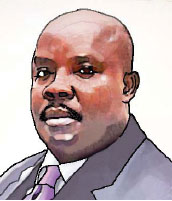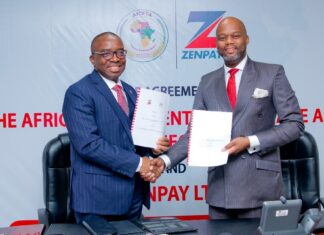It will be a big surprise if, by the time this publication is taken off the newsstands, the Senate President, Dr. Abubakar Bukola Saraki, remains on his hot seat. By the close of last week, it was certain that the odds were clearly stacked against him. In fact, the augury, as it could be said, was bleak and uncertain.
The concern is not particularly on the likely outcome of the Senate President’s ongoing case over asset declaration at the Code of Conduct Tribunal (CCT). That, of course, is a matter left for those knowledgeable in the workings of the judiciary. But in the court of public opinion, he has, more or less, been declared guilty as charged.
And in the typical Nigerian political culture, his seat has been subtly declared vacant, even when he is still in office. There have been reports of nocturnal meetings already taking place even among his friends and, expectedly, foes on who gets what from his anticipated fall.
That is the way of our politicians – friends at dawn and enemies at noon. Theirs is akin to the ways of the vulture, a cursed specie of birds that derives pleasure in feeding on the vulnerable, including its own. In the game of power, Nigerian politicians do not take prisoners; they go for a kill.
Saraki understands the rule as much as his traducers. He learnt from his father, Oloye Olusola Saraki, Senate Leader in the Second Republic, on the intrigues and principles of the game; no permanent friend or enemy, but an eye on fixed interest – power, and in most cases, for personal interest, first.
Take a trip to his background, through to his current position and do an audit on the casualties in his trail. From an unobtrusive office of Special Assistant to the then President Olusegun Obasanjo to emerging Kwara State governor for two solid terms, up to climbing to the Senate, was an audacious exercise that threw some established politicians off-balance. His sister, the ravishing and highly cerebral Gbemisola, was a victim of the march to power and appropriation of Kwara politics.
Not even his father, Oloye, the dreaded godfather of the state’s politics, was spared. Bukola, in fact, dared him and had his way in a manner that no other person did to the man that his words were literally law in the state.
That is how far the quest for and acquisition of power can drive men. But now, the Senate President is clearly at the receiving end. Last week, while he sat in the dock, he was alone. None of the political associates or hangers on came close, or were allowed to do so. He bore his cross, perhaps, with equanimity, or so it seemed.
We cannot make any guess on the outcome of the case. That would amount to preempting the court. Lawyers call it contempt. And it is a big offence. But no matter how it turns out, there should be lessons to be learnt from the trial.
The transparency of the exercise or its absence may signpost the actual direction of President Muhammadu Buhari’s anti-corruption agenda.
CCT can be the vehicle to drive the anti-corruption crusade, if the intentions are right. The last time the country had such opportunity was at the early stages of the Economic and Financial Crimes Commission (EFCC) under Obasanjo. But that was bungled by the very same authorities that instituted the Commission.
Established under the Economic and Financial Crimes Commission (Establishment) Act, 2004, the Commission has among other functions the investigation of all financial crimes, including the advance fee fraud, money laundering, counterfeiting, illegal charge transfers, futures market fraud, fraudulent encashment of negotiable instruments, computer credit fraud and contract scam.
It is also empowered to examine and investigate all reported cases of economic and financial crimes with a view to identifying individuals, corporate bodies or groups involved. It can also identify, trace, freeze, confiscate or seize proceeds derived from terrorist activities, economic and financial crime-related offences or the properties the value of which corresponds to such proceeds.
Given the initial success of the Commission in reining in advance fee criminals and scammers, it was generally seen as a bold move in tackling the incidence of crime that had dented the nation’s image locally and abroad.
With time, however, especially given the closeness of the organisation to Obasanjo and its observed willingness to be used in executing his vindictive wars against opponents, it gradually began to be seen as an instrument of blackmail and intimidation by the government.
EFCC has not been able to recover from that suspicion.
This is the challenge currently facing Buhari and CCT. Since Saraki’s controversial emergence as Senate President, there have been insinuations of lukewarm relationship between him and the President over the latter’s discomfort on how the former ascended the post. How the trial at the CCT pans out may go a long way in reinforcing or disabusing that impression.
But what happens next will be more instructive. Admirers of the President enthuse at addressing him as the New Sheriff in town. That should tally with the change mantra his party, the All Progressives Congress (APC), mouthed before coming to power.
What it should entail is a change of attitude for the better in doing things. In the anti-corruption crusade, it should be holistic. Saraki is not the only Nigerian in and outside the Senate that has held office or presently doing so. The Code of Conduct Bureau (CCB), CCT and other anti-graft agencies should be invited to beam their lights on these former or serving officials. There should be no sacred cows.
That way, the nation should be able to know how clean those currently baying for Saraki’s blood are. By that also, the anti-corruption agenda would be seen to be thorough and comprehensive. And not a mere vindictive exercise!

- Advertisement -
- Advertisement -
Must Read
Zenith Bank’s Zenpay partners AfCFTA to launch smart trade portal
Also speaking during the agreement signing, Mene shared his delight over the partnership with Zenpay Limited in developing SMARTAfCFTA.











